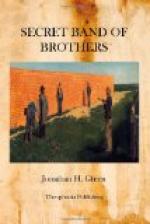I replied in the affirmative.
“Well, they believed for a time that I had them, or would have made others think so; but that kind of accusation would not take with men who knew me. They next laid the charge against you: I have satisfied the interested party, that they are not in the possession of either of us, but that the colonel and his brother have them, and intend thereby to slip more necks into the halter than poor Taylor’s. I am of the opinion, their own necks will pay the price of their treachery.”
I then replied, that I knew Mrs. Brown had said she had lost a package of papers, but what they contained, I knew not.
“Nor ever will know,” said he.
“I have no curiosity about the matter,” I replied.
“And you might as well never have, for curious people will pay dearly for reading them, especially if they undertake it in court, as evidence against the brotherhood.”
The reader can hardly imagine the intense desire that was created, by this time, in my heart, to learn all about this “brotherhood,” and “fraternity,” so often introduced, and yet so obscurely as to give me no certain information.
I took this opportunity to ask Cunningham, what title this society had assumed; whether they were Masons or Odd Fellows? He laughed, and said:
“I thought I had explained some of the particulars to you.” He then stopped, as if to consider, when he continued: “Certainly, Masons and Odd Fellows both, and all other good institutions—but, I can tell you, Green, the brother who has turned state’s evidence swears terrible vengeance against you. Do you be careful. He has many who are watching you. I belong to the party opposed to him and the colonel, and they throw all the blame upon you. You are the victim of their suspicions and hate, and you will do well to leave this place without delay; but tell no one, by any means, that I have given you this information.”
I bade him good day, and we separated.
I now thought I would call once more, and see the colonel. I hastened to the hospital, but as I drew near, I discovered two men riot far from the steps, and the third coming down. I walked by them, without being recognised, and as I passed, the third man had entered into conversation with the other two.
He was asked, “Is it a fact, that he is dead?”
“Yes, certainly. He has been dead about three hours.”
“I knew,” said one, “that he could not stand it long.”
Two of the men, I perceived, were from Lawrenceburgh, the two who stood remotely, one of whom was the identical person who wore the wig, and gave me such good fatherly instruction. I passed to the room, where I found the steward, with three assistants, laying out the corpse.
“We do not wish any more assistance at present,” said the old French steward. I understood his meaning, and left immediately.




